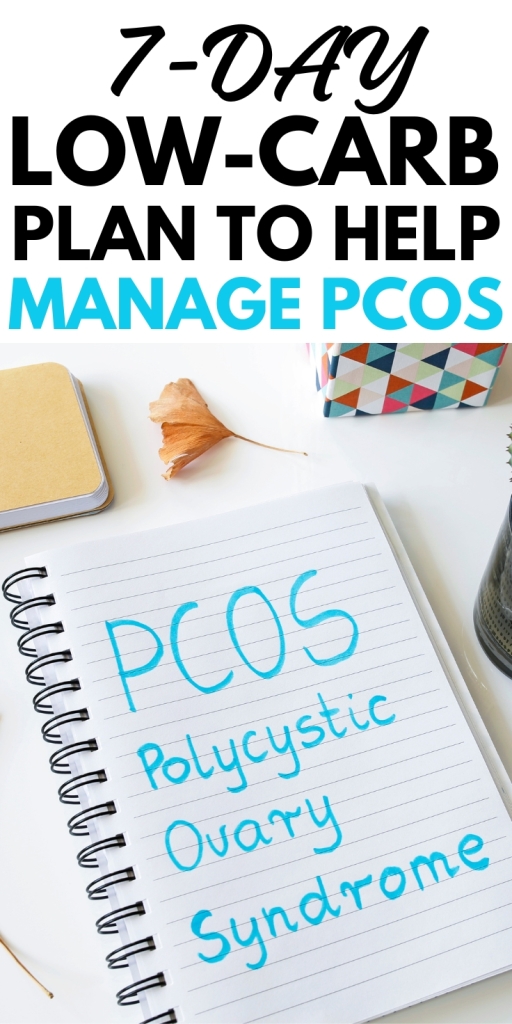Living with PCOS can feel like a constant battle. The hormonal imbalances, the frustrating symptoms, and the endless search for solutions can leave you feeling overwhelmed. But what if I told you that there's a simple, yet powerful, way to take back control? A way to ease your symptoms, boost your energy, and feel your best again. It all starts with the food you eat. This 7-day low-carb meal plan is designed specifically for women with PCOS, helping you to fight inflammation, balance hormones, and reclaim your health. Are you ready to embark on this empowering journey?
The PCOS and Low-Carb Connection
PCOS, or Polycystic Ovary Syndrome, is a common hormonal disorder that affects women of reproductive age. It is characterized by irregular periods, excess androgen (male hormones), and multiple cysts on the ovaries. Women with PCOS are also often insulin resistant, which means their bodies don't respond properly to insulin, a hormone that regulates blood sugar levels. This can lead to weight gain, high blood sugar, and increased risk of developing type 2 diabetes.
A low-carb diet can be a game-changer for women with PCOS. By reducing your intake of carbohydrates, you can improve insulin sensitivity, balance hormones, and lose weight. This, in turn, can lead to a reduction in PCOS symptoms, such as irregular periods, acne, and excess hair growth.

Your 7-Day PCOS Power Plate Meal Plan
Now, let's get to the exciting part! Here's a sample 7-day low-carb meal plan, designed to provide approximately 1,400 calories per day, which is a suitable calorie target for many women aiming to manage PCOS. Remember, this plan is a starting point, and it's essential to customize it based on your unique preferences and dietary needs. Before making any significant changes to your diet, consult with your doctor or a registered dietitian to ensure it aligns with your health goals and any specific considerations.
Day 1
- Breakfast (201 cal, 14g carbs): Greek yogurt (1 cup, nonfat, plain), blackberries (1/3 cup), chopped walnuts (1 Tbsp).
- Morning Snack (160 cal, 18g carbs): 2 clementines, 10 almonds.
- Lunch (360 cal, 30g carbs): White Bean & Veggie Salad (1 serving).
- Afternoon Snack (64 cal, 14g carbs): Raspberries (1 cup).
- Dinner (555 cal, 37g carbs): Ginger-Tahini Oven-Baked Salmon & Vegetables (1 serving).
- Evening Snack (60 cal, 15g carbs): 1 small apple.
Day 2
- Breakfast (288 cal, 22g carbs): Muffin-Tin Omelets with Feta & Peppers (1 serving), medium orange.
- Morning Snack (115 cal, 9g carbs): 1 clementine, 1 string cheese.
- Lunch (344 cal, 47g carbs): Chipotle-Lime Cauliflower Taco Bowls (1 serving).
- Afternoon Snack (102 cal, 20g carbs): Sliced large bell pepper, 1 medium carrot.
- Dinner (549 cal, 14g carbs): Homemade Chicken Tenders with Everything Bagel Seasoning over Salad (1 serving), 1/2 avocado.
- Evening Snack (60 cal, 5g carbs): 1/2 cup Greek yogurt (nonfat, plain).
Day 3
- Breakfast (288 cal, 22g carbs): Muffin-Tin Omelets with Feta & Peppers (1 serving), medium orange.
- Morning Snack (105 cal, 18g carbs): 1 clementine, 1 string cheese.
- Lunch (344 cal, 47g carbs): Chipotle-Lime Cauliflower Taco Bowls (1 serving).
- Afternoon Snack (101 cal, 27g carbs): Medium pear.
- Dinner (525 cal, 25g carbs): Chicken Cutlets with Sun-Dried Tomato Cream Sauce (1 serving), steamed broccoli florets (3 cups).
- Evening Snack (60 cal, 15g carbs): 1 small apple.
Day 4
- Breakfast (229 cal, 30g carbs): Blueberry Almond Chia Pudding (1 serving).
- Morning Snack (160 cal, 18g carbs): 2 clementines, 10 almonds.
- Lunch (344 cal, 47g carbs): Chipotle-Lime Cauliflower Taco Bowls (1 serving).
- Afternoon Snack (226 cal, 7g carbs): Muffin-Tin Omelets with Feta & Peppers (1 serving).
- Dinner (441 cal, 21g carbs): Sheet-Pan Maple-Mustard Pork Chops & Carrots (1 serving).
Day 5
- Breakfast (229 cal, 30g carbs): Blueberry Almond Chia Pudding (1 serving).
- Morning Snack (132 cal, 8g carbs): Nonfat plain Greek yogurt (1 cup).
- Lunch (344 cal, 47g carbs): Chipotle-Lime Cauliflower Taco Bowls (1 serving).
- Afternoon Snack (154 cal, 6g carbs): Dry-roasted unsalted almonds (20 pieces).
- Dinner (490 cal, 27g carbs): No-Noodle Eggplant Lasagna (1 serving), Traditional Greek Salad (1 serving).
- Evening Snack (60 cal, 15g carbs): 1 small apple.
Day 6
- Breakfast (201 cal, 14g carbs): Greek yogurt (1 cup, nonfat, plain), blackberries (1/3 cup), chopped walnuts (1 Tbsp).
- Morning Snack (191 cal, 37g carbs): Large pear, 10 almonds.
- Lunch (348 cal, 30g carbs): No-Noodle Eggplant Lasagna (1 serving), pomegranate seeds (1/3 cup).
- Afternoon Snack (116 cal, 31g carbs): Large apple.
- Dinner (428 cal, 17g carbs): Tofu & Vegetable Curry with Zucchini Noodles (1 serving).
- Evening Snack (115 cal, 5g carbs): 1 boiled egg (large).
Day 7
- Breakfast (288 cal, 22g carbs): Muffin-Tin Omelets with Feta & Peppers (1 serving), medium orange.
- Morning Snack (105 cal, 12g carbs): Medium carrots, sliced (2), 1 string cheese.
- Lunch (337 cal, 26g carbs): No-Noodle Eggplant Lasagna (1 serving), sliced medium bell pepper.
- Afternoon Snack (131 cal, 35g carbs): Large pear.
- Dinner (474 cal, 13g carbs): Shrimp Cauliflower Fried Rice (1 serving), mixed greens (2 cups), Homemade Vinaigrette with Sesame & Ginger (1 serving), 1/2 avocado.
- Evening Snack (60 cal, 15g carbs): 1/2 cup Greek yogurt (nonfat, plain).
Beyond the Plate: Additional Tips for Managing PCOS
While diet plays a crucial role in managing PCOS, it's not the only factor to consider. Here are a few additional tips to help you reclaim your health:
- Get Regular Exercise: Aim for at least 30 minutes of moderate-intensity exercise most days of the week. Exercise can help improve insulin sensitivity, reduce stress, and promote weight loss.
- Manage Stress: Chronic stress can worsen PCOS symptoms. Find healthy ways to manage stress, such as yoga, meditation, or spending time in nature.
- Get Enough Sleep: Aim for 7-8 hours of quality sleep each night. Sleep deprivation can disrupt hormone balance and contribute to insulin resistance.
- Consider Supplements: Certain supplements, such as inositol and vitamin D, may be beneficial for women with PCOS. Talk to your doctor about whether supplements are right for you.
Taking control of your PCOS journey starts with making informed choices about your diet and lifestyle. This 7-day low-carb meal plan is a great starting point, but remember, it's a journey, not a race. Be kind to yourself, listen to your body, and don't be afraid to make adjustments along the way. With dedication and perseverance, you can manage your PCOS symptoms, boost your overall health, and live a vibrant life.
Remember: This meal plan is a suggestion, and it's essential to consult with your healthcare professional for personalized guidance. They can help you create a plan that's tailored to your specific needs and health goals.
Now, it's your turn! Have you tried a low-carb diet for PCOS? What are your favorite low-carb meals and snacks? Share your experiences and tips in the comments below! We're all in this together!







